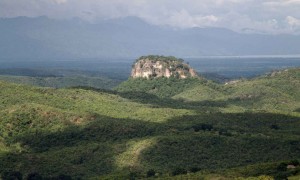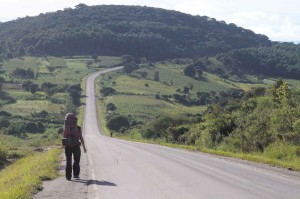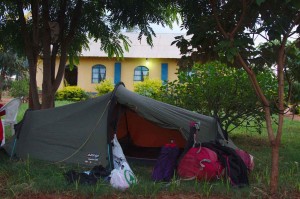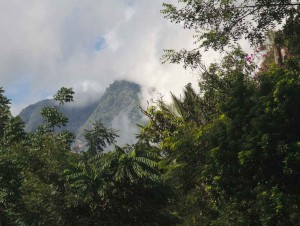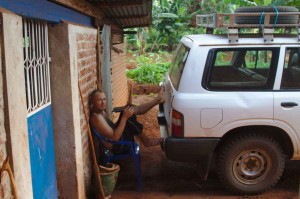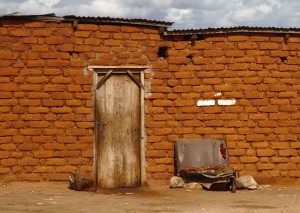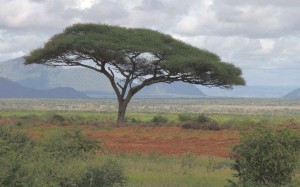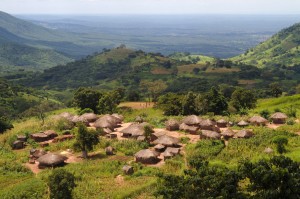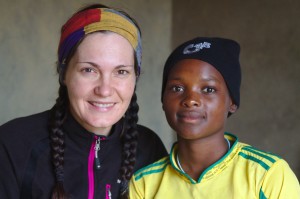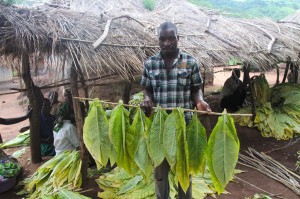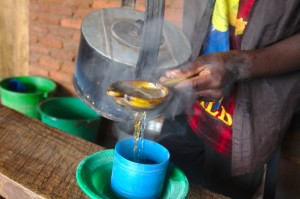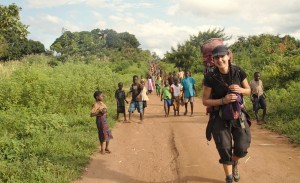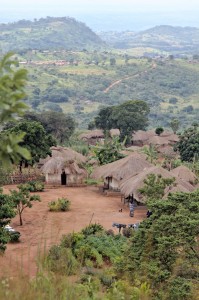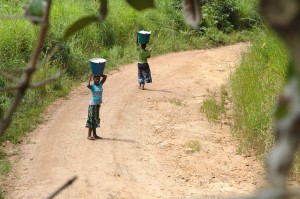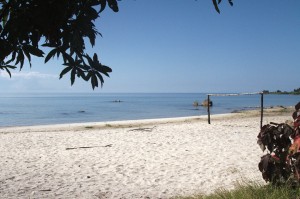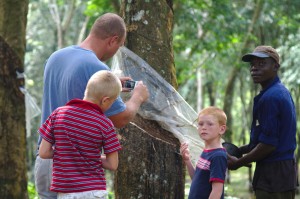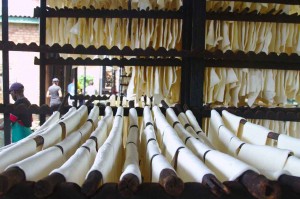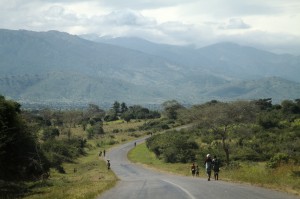To complete Tanzanian part perhaps one would need to sing ode to the beauty of the nature and make a scary film about mad drivers constantly on the edge, especially seeing so many accidents on the road.
Mbeya – Iringa: the drivers in trouble
In Malawi and Zambia we all got used to people and environment, it all felt so familiar and clear. Let it be people asked us for things, but generally they were friendly and the countries were really pleasant to hitch through. Tanzania is a new big country, where people don’t speak English. But drivers are friendly and they immediately prepare seat for you despite the fact you are not intending to pay them.
The nature perhaps best observed from the bike seat, slowly, watching baobabs, valleys, Masai shepherds walking the goats.
We come closer to Mbeya, and all of a sudden instead of a wet night (rainy season is coming) we found ourselves in the family, who randomly invited us to their home. First hot shower, fish dinner and first stories about Tanzanian economical progress and the most inspirational president, who made Tanzania so united with no tribal fights unlike in Kenya.
Next morning we up again on our feet on the road. The policemen stop trucks regularly, and every driver has got a small bribe prepared, and it feels like they pay road tolls. But maybe once this bribe was not big enough, so the policemen were not happy we are far too many in the cabin. ‘We arresting the driver. But he says he is only helping you. Is that right?’ It seems that not getting money from us meant the driver is not obliged to pay to policemen too. Fine, we are moving further.
The sun is getting down, so its a high time to find a place to sleep. Oh there is a church up on the hill, we might find a good place there.
– Could we pitch a tent for a night?
– Are you Christians?
– Catholics.
– Oh, we are Lutherans, you better go down the hill, there is a catholic church.
– But we don’t see the difference.
– You don’t see the difference? surprised guy look at us.
Well, we indeed don’t see the difference whether to sleep or hitch the Muslims, Buddhists or others.
-Do you write stories about your journey?
– Yes, we do.
-Ok then.
They found a place for us to pitch a tent facing the hills, but didn’t forget to ask to mention them. We mention them.
Fleeing the police and truck safari
Young truck drivers quickly showed us to get in despite the fact only company not money that we can offer. They are going to Morogoro, so we can just sit down on the sleeping part of the cabin and relax. But for the next half an hour only. We look around. Its interesting whether the officers will say anything about that their truck have got no side mirrors. OK, there is one, that shows the front wheel. But policemen take no notice of that.
But for the following traffic officer our drivers decide not to stop. Oh, the police gets mad and starts following the car. The drivers would not even think to stop on that occasion. Rather how to get around the blocking cop car. And if not another police in front, the chasing part would still go on. The officers surely got mad. Both parties are unhappy, and the officers even want to hear a word or two from us about the event. But the money is almighty, and wash any sin committed. We just move on, hoping no more mad driving exercises will be in the past.
A driver yesterday warned us not to walk (as sometimes we walk for miles just to enjoy the sight until we hitch a car) as soon we approach the Mikumi park. ‘Lions there are lions there, so don’t walk’. The road goes only 50km through the park, but we already managed to see elephants, giraffes and zebras. We even didn’t need to pay for extremely expensive safaris, and besides you can have this illusion, that humans and animals can cohabit right by side.
Morogoro. Santa and Kevin :qualities versus needs
Santa is a Latvian friend from the older times. To hear from her about African life is interesting. Traveling here we found ourselves quite frustrated at times, just being constantly observed. But how people can cope living constantly here.
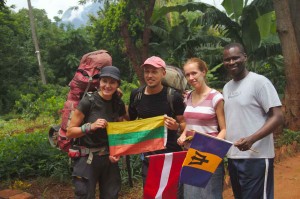
Misionieriai: Santa iš Latvijos ir Kevinas iš Barbadoso. | Missionairs: Santa from Latvia and Kevin form Barbados.
Santa came here a year and a half ago. At first she only thought its going to be a temporary voluntary work in the village. But by meeting a Kevin, missionary from Barbados, it changed the course of her life, and she is back again here. But now for uncertain period of time.
Living in Tanzania can be lovely and exotic. The sun shines all year round, and that is massive thing in comparison with a short Baltic summer. There is a variety of fruits and vegetables.
But Africa can have its difficult moments too. People live here in communities, which can be a very positive thing, but at times can be tiresome, when you need your own space. When you constantly here, oh mazungu does this, mazungu does that, you start feeling you want to disappear. It perhaps can be compared a little with superstars, who are constantly observed and have no personal space in public places.
When you are a white person here, people often expect you to give, support, find money for them. So sometimes you don’t know whether the acquaintance will lead to the friendship or it will end ‘can you pay for my studies at university?’ We start thinking that it might be the culture differences. If one person prospers in Africa, he helps his entire family. But how to combine those differences of those cultures.
We start talking more about giving. Kevin and Santa are missionaries so their work definitely involves a part of managing money and sharing knowledge. So how to give by not harming the person. Kevin says that looking not at the needs but the the qualities of the people should be encouraged and pursued. Sometimes the western people bring heaps of colorful gifts and then kids simply start feeling unhappy anymore, they don’t want to learn or even make their own toys. Alistair Humphreys after his trip through Africa concluded that kids do not need much, only food, shelter, education, love and laughter. They would not feel any happier with massive gifts.
Santa recollects, that some western organisation provided Masai with solar batteries, so they would not need using charcoal. After some time after having paid a visit, Masai still using charcoal. Why? Well, to use solar batteries they need to cook outside, but then they would never have any food left as the bypassers would come and expect food given, a cultural thing. Or a writer Theroux in his book Dark Star Safari tells, that even the local doctors do not work anymore locally, as the western specialists can work here for free being financed by the organisation at home. So giving seems again to be a harmful rather than positive after all.
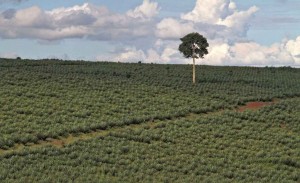
Sesau plantacija. Augalai naudojami virvėms ir krepšiams daryti. | Sesau plantation. The plant leaves are used to make ropes and baskets.
As authors Cobart and Fikkert* say, that if we only going to heal the symptoms instead of getting the right diagnosis. We often project our ideas onto others thinking that we know better how to do things. Like western people feel they have better knowledge, they can better manage things, and that they can buy anything. But all this only means paternalism, when you feel that you are higher than the others.
Dar es Salaam – a trap we got not into
We got completely exhausted after the unsuccessful hunt for Sudanese and Egyptian visa. We finally thought to sit down and have some food. And all of a sudden there is a guy nicely dressed ready to show us there is a cheap good place. He joins us, but has no intention of having food with us. Eventually his friend joins us too. Apparently they are taxi drivers and are more than happy to help us with visas, as they know some Ethiopian ambassador in some suburban part. ‘There is no Ethiopian embassy in this capital, so how on earth he will find any mysterious ambassadors. ˜Oh no no, thanks we are ok. We will call you if you will change our minds’. We had to be strict to ask to be left alone. Who on earth would get into such a strange trap. But apparently people do. It is why we hate touristic places, as people at times can be so tricky. We go to see the Indian Ocean instead and have some relax time.
From Morogoro to Arusha – the hell on the road
Christopher and Emanuel, two brothers winked at us to get in. From Morogoro to Arusha is around eight hundred kilometres, so we prepared at least couple days to get there, but these guys wanted to get there that day before dark. ‘We agreed with my brother I’m going between 120 and 140kmh. The roads are not too wide and straight, and he is on 160kmh already. ˜If Japanese have made the speedometer with 180kmh, we should test it’. He is already finishing the second whiskey bottle, so the atmosphere is getting intense. And you see the accidents on the road constantly. A close -to-hit nearly an accident situation, and we fail the fear exam. We got out of the car. You can only imagine how we enjoyed the sturdy walk and much slower ride to Arusha.
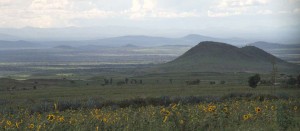
Dabar lietingasis sezonas tad ir pievos žydi. | Now is the rainy season so everything is lush green.
Kilimanjaro was all in clouds, so despite the fact that we were so close to it, we just could imagine the snowy cap and its noble appearance. The last night in Tanzania in Namanga in a peaceful yard of the church, and we are ready to tackle yet another country. Kenya is in front of us.
*Steve Corbert ir Brian Fikkert: when helping hurts. How to alleviate poverty without hurting the poor and yourself.

